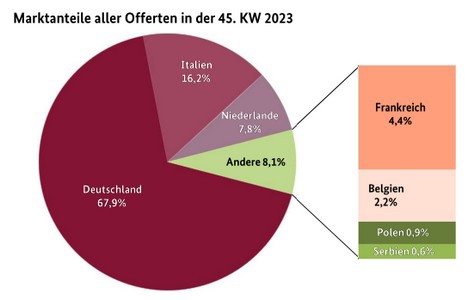Domestic apple offerings continued to clearly dominate the market, in line with the time of the season. With Elstar, Boskoop and Jonagold, the already established varieties formed the basis of the product range. According to the BLE, the presence of Kanzi and Pinova had expanded. The first Jazz were added to the range and cost €12 per 4.5kg carton in Frankfurt. Sales of the newer varieties Deichperle and Wurtwinning also went smoothly there at prices of €1.60 per kg. Deliveries from Italy, France, Belgium and the Netherlands were ultimately only of a supplementary nature. A few imports from Eastern Europe rounded off the marketing.
Overall, business was quiet. Retailers rarely had cause to modify their previous demands. Only Cologne reported volume-induced reductions for individual lots. While the previous year's harvest volume was still very high, the domestic harvest volume of apples this year is significantly lower than in previous years. Unfavourable weather conditions during flowering and the resulting reduction in pollination are often cited as the reason for this. Excessive heat and prolonged drought during the summer months as well as diseases also had a negative impact on production conditions.
 © BLE
© BLE
Click here for the full market and price report
Table grapes
Availability of the leading Italian and Turkish products was rather tight, and in some cases it was not possible to cover demand in full. Prices therefore often trended upwards: €5 per kg was not uncommon in Cologne. Turkish products were increasingly transhipped in winter packs, which also made them more expensive.
Bananas
Supply and demand were sufficiently balanced. Demand could therefore be met without difficulty. In most cases, prices remained at their previous levels. Only in Munich was there an improvement in accommodation.
Cauliflower
Domestic batches dominated ahead of Belgian, Dutch, French and Italian. Availability had become more limited. Interest, however, remained quite positive. Valuations often showed an upward trend: customers in Cologne were expected to pay €15 per pack of 6 for Dutch produce.
Sweet peppers
Spanish deliveries now predominated. Dutch and Belgian deliveries followed in terms of importance, but were occasionally not available on all days. Turkish imports were of a supplementary nature and could generally be sold without any problems. The presence of Moroccan consignments increased.
Source:BLE










